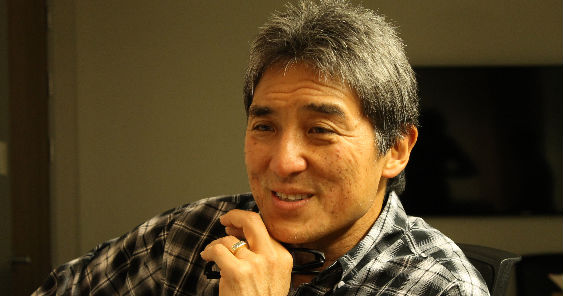MANILA – 30 years ago, if anyone had told Guy Kawasaki that he would write 13 books in the next three decades, he would have called them crazy. However, that’s exactly what Apple’s former chief evangelist ended up doing.
Kawasaki, now chief evangelist for Canva, is the author of bestselling books such as Enchantment, The Art of the Start, Rules for Revolutionaries and a book on social media, which will be released on December 4.
In an exclusive interview with adobo magazine editor in chief Angel Guerrero, Kawasaki shared some social media power tips, as well as his thoughts on democratization, advertising, and creating good content.
Read on to know what makes a good avatar, and discover what Kawasaki had to say about Android vs. iOS (the answer may come as a surprise), the art of startups, and getting the theoretical lonelyboy15 to love your product.
On Apple
You worked with Steve Jobs and yesterday you talked about the 10 things you learned from him. Of the 10, what’s the most important one?
Probably the most important lesson from Steve Jobs is that great innovation occurs when you jump to the next curve, not do a curve better. Macintosh was not doing Apple II slightly better. Macintosh was a curve jump over Apple II and that’s where true innovation occurs.
On becoming an expert
You give this big advice on how you change the world. Big picture stuff. And that’s big. And that’s the premise of where you are now. You’re here to teach people to change the world, and that’s the way you paved your career, right? How did you start to be such an expert in all of this?
First of all, I don’t know myself as an expert in anything. To a large degree, I think people who believe they’re experts are full of shit. Because it’s too self-referential and people decide you’re an expert. You don’t decide that you’re an expert. So I never hold myself out that way. Now if they come to that conclusion, I’m not going to differ with it.
How did you build it up, the expertise?
Oh it was very easy. It only took 30 years. That’s the serious answer, it took 30 years and honestly, I never set off to – 30 years ago I didn’t say, Guy, you’re going to become an expert. I just do stuff. I started companies, I wrote books. But it was, it’s not like Karate Kid. As a course of having to make a living, I had to learn to do stuff.
So what you set out to do 30 years ago for instance is not where you see yourself now. What did you want to do 30 years ago?
Start a company.
So it’s really at the core of your being.
It is at the core. But 30 years ago, if you had said, Guy, in 30 years you will have written 13 books, I would have told you that you’re crazy. There’s no way. Maybe one. But 13? I don’t think so.
On startups
You have one of your books that’s titled The Art of the Start, right? What is the art of startups, in general terms?
The art of startups is first of all to jump curves, like I said, and this book is 10 years old, so I’m rewriting it. It’s coming out in March. It’s very different.
What’s the difference?
Well, 10 years ago there was no Cloud, there was no crowd, there was no social media. 10 years ago you wrote a business plan, 20 to 50 pages long, that you know, thought people were going to read. Today you don’t have to write a business plan.
What do you do now if you’re not writing business plans?
Ideally you have a great prototype. Second step is if not a great prototype you have a nice, tight 10 or 15-slide pitch. You don’t need to write a business plan because business plans are bullshit anyway, so it doesn’t matter. And everybody knows it’s bullshit. So there are some very big changes.
And I’ll also tell you that 30 years ago there was this concept of marketing top-down. So the reporter at the Wall Street Journal or Wired, or CNN or whatever, you sucked up to them. Because if the Wall Street Journal said to use your spreadsheet, you had it made. Lotus 1, 2, 3, you are set. I don’t think that’s true anymore. I think today, most of those magazines, they represent what people have decided is good. As opposed to kingmakers, they are reporters. So if you believe that, that changes all of marketing. Because now, I’m not saying you shouldn’t suck up to the Wall Street Journal. You should suck up. People should still suck up to you.
But, I think even you would say that if you saw some social media service just taking off phenomenally in the Philippines, you have no choice but to write about it. That’s different. 30 years ago they would have come to you and said, please bless our product so you can make us successful. I don’t think that’s true anymore.
And if you believe that theory, that changes everything. Because now the key is you need to find what I call the theoretical lonelyboy15 to make your product tip. Again, don’t ignore the Wall Street Journal if you think that Wall Street Journal is going to bless you. The odds of first of all getting a review in the Wall Street Journal, there’s only 52 reviews a year, so it’s low. On the other hand, if you get a lot of lonelyboy15s to love your product… I don’t think anybody uses Twitter because the Wall Street Journal eight years ago said, you should use Twitter to tell people your cat rolled over.
Talking about startups, how many startups have you started? How many companies have you helped start up?
Directly myself, three or four. But advising, dozens. I’m in a startup right now called Canva. Canva is going to democratize design. It’s going to make design accessible, it’s going to empower people to become designers. It’s going to change the world of design.
On democratization
You’re a believer of democratization of things. Why do you find it so important?
First of all, I have a high sense that… I am morally offended when people do not live in a meritocracy. That what counts is your wealth, your connections, your family or whatever, not your competence, not your merit. I can’t stand that.
Have you seen it happen for you not to stand it? Is it something you observed is going on predominantly?
In the United States, if you come from this wealthy East Coast family, and you go to Dartmouth and then you go to Goldman Sachs or whatever, that’s not a meritocracy. There’s two aspects to a meritocracy. One is the people who are connected, the rich bozos and all that, it brings them down. But also it seems to me that some 15-year-old kid who’s going to high school in Manila should be able to become the next Steve Jobs. I think so. Why not? Just because he’s Filipino, he didn’t go to Harvard, he didn’t go to finishing school, he didn’t go to Cambridge, whatever. What difference does it make? You’re either good or you’re not.
On Canva
Now you talk about Canva. There are so many startups out there. So many ideas out there, and you picked Canva. Why?
Well in a sense Canva picked me, but –
They found you using it, right?
Right, so they found me using it, that’s already a sign of some intelligence that they found me. So I just love the product, it’s so simple, it’s so elegant, it’s so empowering. It’s just like Macintosh. Empowering people to do things that they could not do.
What future do you see for Canva? Do you see some big, somebody taking over and taking it in?
At an extreme, it could be the next Adobe. I mean, that’s a big dream-
And you have a good team on board. Congratulations on that. Now, your role is being an evangelist. what are you evangelizing?
Evangelizing, evangelism from Greek words that mean bringing the good news. So if at Macintosh I brought the good news of this personal computer that people could use, with Canva, I’m bringing the good news of a design service that people can use. You can go create all these graphics, and that is a beautiful thing. That’s a very empowering thing.
On antisocial social media
You have millions of followers on social media, what’s your conversation like with them?
Honestly, I am primarily a curator. And I’m primarily pushing out content. I’m not one of these kind of people that’s you know, looking for a few great relationships that are engaged and conversational. I’m pushing stuff out. I see myself as like you know, NPR and CNN. I’m pushing crap out and I want people to say the reason why they follow me is I would have never found that article, I would have never found that picture or post, but Guy found it for me. I do answer a lot of comments, but a lot of social media experts believe that it should be… they emphasize the word social. I emphasize the word media. I’m the antisocial social media person.
So you wrote a book, and it’s coming out on December 4, about social media. Tell us about it.
This is a book that is very tactical. It is how to use social media as a platform. It is not written in an insulting manner. Like I think, many of these books, they start off by saying you need to be open and transparent. Like okay, so great, open and transparent and honest. To me that’s what’s called a duh-ism. I don’t need to read a book to know that I need to be open and transparent and honest. If you need to read a book to figure that out, you’re beyond helping. So these are power tips, and are very, very tactical.
Social media power tips
One example is I tell people, okay, this is what an avatar should do. You should show your face. Only your face. Not your dog, not your car, not your spouse. Your face. Because people want to look at your face and decide that you’re likeable and trustworthy. I want your avatar to be frontlit, I want it to be asymmetrical and I want it to show that you have a Duchenne smile, the smile that uses the crow’s feet in your eyes, and that’s it. So go look at your avatar and tell me do you do that, or do you have some dumbass avatar showing you with your Corvette that you think is cool. It can’t get more tactical than that.
Another social media tip: Repeat your tweets. If you think you tweet once at 8 am in Manila time and you think somebody in California is going to read that, you’re on crack. You’re not that good that people are going to scroll back through millions of tweets. I can tell you with total certainty, I’ve repeated tweets four times eight hours apart, I get four times the click through. So I can either get 1500 clicks or I can get 6000. So what do you want? Now when you do that, some people are going to complain.
So my power tip number 3 is it’s okay if people are complaining, because if you’re not using social media and pissing some people off, you’re not using it well. Some people should be pissed off. And my logic there is if somebody says to you, ‘my god, you repeated this tweet’, my response to that person is, you need more of a life. because if you saw that I repeated a tweet eight hours apart, how is it that you saw two tweets? It would be like if you watch CNN, you would see that they repeat the stories all day long. Identical, not an update, absolutely identical story. Do you call up CNN and say, why did you repeat that story? You should just run it at 8 am, that’s when I watch it. And then you have to have original content the rest of the day. It’s ridiculous. So what’s the difference? There’s no difference.
On brands that buy likes
You mentioned that brands buy likes on social media. You’re really disgusted with that, right? What do you think they should do?
They should fricking find and create great content. That’s what they should do. And buying likes and buying fans and buying circles and buying all that is total unequivocal bullshit. It is unethical, they’re probably doing it with their clients’ money, because their clients are too stupid to know that that’s unethical and it’s meaningless, but you know they set up a marketing objective of we’re going to get two million followers, and they get the budget to get two million followers and they buy two million people in China, 16 years old, sign up, whatever it is, and they declare victory. That is so stupid, it’s an insult to my intelligence.
So you talk about content. What are people looking for? Is it entertainment? Information?
They’re looking for information – what just happened. Analysis – what does it mean that this just happened, or assistance – how do I make this good thing happen; how do I avoid a bad thing. The fourth thing that they’re looking for is entertainment. This is like the world’s best video of a whale exploding or something like that. I don’t know.
The test that I call is the reshare test. You’re posting stuff that’s so great that people are resharing. Let’s pretend that I’m in charge of social media for adobo. So of course I want people to read adobo. So of course I’m going to tweet out my links to my stories. But if I were adobo, let’s say that BBDO put together a YouTube video of the best commercials they ever did in their history. So 1984, whatever. So this is a five-minute YouTube video. I would tweet that out. Let’s say that Jay Chiat decides to write ‘The Top 10 Things I’ve Learned About Advertising in my Life.’ Now let’s take an extreme case. He publishes that in Advertising Age, arguably your competitor. I would still post it. I would post it because I think what you want is credibility so that people will say ‘If I follow adobo, it’s not just them pimping out their own stuff. They’re finding stuff that I would have never found.’ And I think that is very powerful. And if somebody does a study that these are the top 100 most valuable brands in the world, I would link to that. Because it’s not what you want to post, it’s what people want to read. There’s a very big difference. So that’s what I would do.
What do you think of ad agencies?
I’m not an advertising person, but I can tell you what I think about advertising agencies who position themselves as social media experts. I think they don’t have a clue. They’re the people who are buying stuff. I’ve interacted with agencies and they have this logic like well, we “know” that the optimal number of times to post on Facebook is once per day, and I say to them, how do you know that. And they say, well, because once, we posted twice and we got like, a whole lot of complaints, so I go, how many were a whole lot of complaints?
So they say like, 10 complaints. So you get 10 complaints, out of two million followers. I’m telling you you got twice the readership by risking ten complaints and you’re telling me you know that that’s optimal. How do you know? That’s what I cannot stand.
Their perspective is that if anybody complains, it’s a crisis. So, it’s not a crisis. It’s kind of just analytics. If you tell me you post twice and the next day you lost 50k followers, okay. Maybe I can believe you. If you posted twice and you got 10 complaints, what is the problem?








